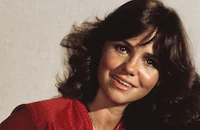Places In The Heart

Brief Synopsis
Cast & Crew
Robert Benton
Sally Field
Ed Harris
Amy Madigan
John Malkovich
Danny Glover
Film Details
Technical Specs
Synopsis
After her sheriff husband is killed, a Texas woman tires to make ends meet for her family during the depression by raising cotton and taking in boarders, one of whom is a blind man.
Director
Robert Benton
Cast

Sally Field

Ed Harris

Amy Madigan

John Malkovich

Danny Glover
Cheryl Hardwick
Randy Fife
Paul Goodwin
Yankton Hatten
De'voreaux White
Norma Young
Bascom Newman
Jerry Haynes
Lou Hancock
William J Welch
Connie Grandell
Ned Dowd
J C Quinn
Lynn Covey
Cliff Brunner
Ray Baker
Gregg Brazzel
Lynn D Laswell
Trey Wilson
Arthur Pugh
Jay Patterson
Gennie James
Jim Gough
Bert Remsen
Robert Schenkkan
Shanna Shrum
Toni Hudson
Bill Thurman
Matthew Posey

Lane Smith
Lindsay Crouse
Terry O'quinn
Paul Nuckles
Shelby Brammer
Vernon Grote
Crew
Calvin Acord
Nestor Almendros
Clint Althouse
Mary Ann Austin
Robert Benton
Barbara Blanchette
Richard Brick
John Brittain
Norman Buckley
Gene Callahan
Lou Cerborino
Richard P. Cirincione
Rachel Cline
Randall Coleman
Robert G Connors
Lynn Covey
Brian Cowden
Walter Crespo
Arlene Donovan
Jay Dranch
David Dreyfuss
Dick Dubuque
Jack Eberhart
David Evans-lombe
Bran Ferren
Howard Feuer
Tom Fleischman
Richard Friedlander
Bob Hall
Michael Hausman
Lindsey Hicks
Derek R. Hill
Beccie Hilliard
Bob Horne
Roger Irvin
Michael Jacobi
Ingrid Johanson
John Kander
Rody Kent
Bruce Kitzmeyer
Paul Leblanc
Sondra Lee
Dan Lerner
Lois Lipfield
Carol Littleton
Sidney Z. Litwack
James Maceo
Mary Malin
Lee Mayes
Roy Mcbride
Peter Mcguire
Al Milligan
Bob Mills
Paul Nuckles
Bitty O'sullivan-smith
Peter Odabashian
Bruce Pearson
Philip C Pfeiffer
James Pilcher
Lee Poll
Bobby Porter
Robert Prate
Thomas Prate
James Pullen
Rich Quinlan
Anne Rapp
Don Reddy
Ken Rinker
Jeremy Ritzer
Fred Rosenberg
Zade Rosenthal
Ann Roth
Jill Savitt
Silvio Scarano
Sharon Schaffer
Mark Schotte
Mort Schwartz
Stephen Shiekman
Howard Shore
Howard Shore
Jeff Stern
Yolanda Toussieng
Joel Tuber
Barbara Tulliver
Henry Wolf
Rebecca Wood
Videos
Movie Clip



Hosted Intro
Film Details
Technical Specs
Award Wins
Best Actress
Best Original Screenplay
Award Nominations
Best Costume Design
Best Director
Best Picture
Best Supporting Actor
Best Supporting Actress
Articles
Places in the Heart
The Places in the Heart award was actually Field's second Oscar® win. Her first Best Actress statuette came in 1979 for her role as mill worker/activist Norma Rae. Despite her success, Field apparently thought the first award was a fluke.
Field began her acting career in 1965 as TV's Gidget and a few years later appeared as The Flying Nun. But her perky image was confining and Field was eager to shed it, taking on roles like a junkie in the TV movie Maybe I'll Come Home In the Spring (1976) and taking it off for a nude scene in the feature film Stay Hungry (1975). At the same time, a TV career could also be limiting and many stars found it impossible to jump from the small screen to the big screen. But in 1976, Sally Field's television career came to a climax with an Emmy for her unforgettable portrayal of a mentally disturbed woman with sixteen personalities in Sybil. After that, Field spent most of her time on the big screen, beginning with her role in Smokey and the Bandit (1977), which co-stared off screen love interest Burt Reynolds.
A mix of movies followed, from Absence of Malice (1981) to Smokey and the Bandit II (1980). Nonetheless, Field was still unsure that she'd shaken her TV image. But in 1984, when casting Places in the Heart, writer/director Robert Benton had no doubts about Field's ability. Benton had based the film on his own Depression era childhood in Texas and thought Sally would be perfect as his widowed heroine. He defended her early work. "If Sally hadn't been so good in Gidget or the The Flying Nun, do you think anyone would remember her in those roles?"
In the end, Benton was right. Places in the Heart was nominated for seven Academy Awards®, including Best Picture, Best Supporting Actor for John Malkovich and Best Supporting Actress for Lindsay. And it won two awards - Best Original Screenplay for Benton and, of course, Best Actress for Field.
On award night, emotions got the better of Field who shook her head in disbelief upon hearing her name announced. She thanked Benton and the cast, then for the first time seemed to believe she deserved her success. "The first time I didn't feel it," she said in her acceptance speech. "But this time I feel it and I can't deny the fact you like me. Right now, you like me."
Director/Screenwriter: Robert Benton
Producer: Arlene Donovan
Cinematographer: Nestor Almendros
Composer: John Kander, Howard Shore
Editor: Carol Littleton
Production Designer: Gene Callahan
Art Director: Sydney Z. Litwack
Executive Producer: Michael Hausman
Set Designer: Derek R. Hill, Lee Poll
Costume Designer: Mary Malin, Ann Roth
Cast: Sally Field (Edna Spalding), Lindsay Crouse (Margaret Lomax), Ed Harris (Wayne Lomax), Amy Madigan (Viola Kelsey), John Malkovich (Mr. Will), Danny Glover (Moze).
C-113m. Letterboxed.
by Stephanie Thames

Places in the Heart
Lane Smith (1936-2005)
Born in Memphis, Tennessee on April 29, 1936, Smith had a desire to act from a very young age. After a brief stint in the Army, he moved to New York to study at the Actors Studio and made his debut on off-Broadway debut in 1959. For the next 20 years, Smith was a staple of the New York stage before sinking his teeth into television: Kojak, The Rockford Files, Dallas; and small parts in big films: Rooster Cogburn (1975), Network (1976).
In 1978, he moved to Los Angeles to focus on better film roles, and his toothy grin and southern drawl found him a niche in backwoods dramas: Resurrection (1980), Honeysuckle Rose (1980); and a prominent role as the feisty Mayor in the dated Cold War political yarn Red Dawn (1984).
Smith returned to New York in 1984 and scored a hit on Broadway when he received a starring role in David Mamet's Glengarry Glen Ross and earned a drama desk award in the process. His breakthrough role for many critics and colleagues was his powerful turn as Richard Nixon in The Final Days (1989); a docudrama based on the book by Bob Woodward and Carl Bernstein. He earned a Golden Globe nomination for his spot-on portrayal of the fallen President, and his career picked up from there as parts in prominent Hollywood films came his way: Air America (1990), My Cousin Vinny, The Mighty Ducks (both 1992), and the Pauly Shore comedy Son in Law (1993).
For all his dependable performances over the years, Smith wasn't a familiar presence to millions of viewers until he landed the plump role of Perry White, the editor of the Daily Planet in Superman: Lois and Clark which co-starred Dean Cain and Teri Hatcher (1993-1997). After that run, he gave a scorching performance as Reverend Jeremiah Brown in the teleplay Inherit the Wind (1999); and he appeared last in the miniseries Out of Order (2003). He is survived by his wife Debbie; and son, Rob.
by Michael T. Toole
Lane Smith (1936-2005)
Quotes
Trivia
Miscellaneous Notes
Voted Best Supporting Actor (Malkovich) and One of the Year's Ten Best Films by the 1984 National Board of Review.
Voted Best Supporting Actor (Malkovich) by the 1984 National Sociaty of Film Critics.
Winner of the Best Director Prize at the 1985 Berlin Film Festival.
Released in United States 1985
Released in United States on Video September 1987
Released in United States September 1984
Released in United States Summer September 1, 1984
Shown at the Berlin 1985 International Film Festival.
Completed shooting July 1984.
Released in United States 1985 (Shown at the Berlin 1985 International Film Festival.)
Released in United States September 1984
Released in United States on Video September 1987
Released in United States Summer September 1, 1984















